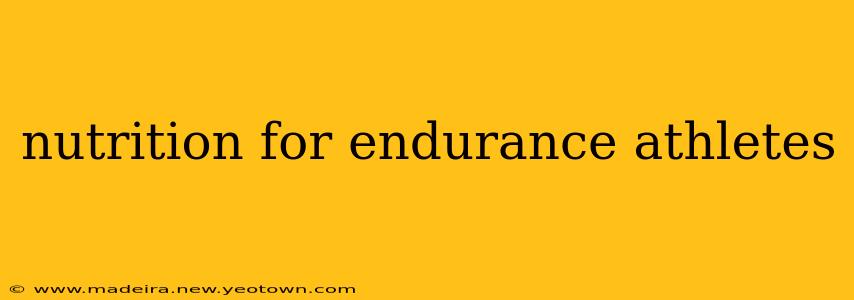Endurance sports, whether it's a marathon, an Ironman triathlon, or a grueling cycling race, demand a unique approach to nutrition. It's not just about eating enough; it's about fueling your body strategically to maximize performance, recovery, and overall health. This isn't a one-size-fits-all approach; individual needs vary depending on the intensity and duration of training and competition. However, some key principles remain consistent for all endurance athletes.
What are the macronutrient needs for endurance athletes?
This is a fundamental question, and the answer hinges on several factors. Imagine a marathon runner versus a long-distance cyclist. Their energy expenditure will differ, leading to varied macronutrient needs. Generally, endurance athletes require a higher carbohydrate intake than the average person. Carbohydrates are the body's primary fuel source during prolonged exercise. They replenish glycogen stores in the muscles and liver, preventing "hitting the wall." Protein plays a crucial role in muscle repair and growth, essential after intense training sessions. Finally, fats provide sustained energy and support hormone production. The ideal macronutrient ratio varies depending on training volume and intensity, but a common range is 55-65% carbohydrates, 15-25% protein, and 20-30% fats.
How much protein should an endurance athlete consume?
Many mistakenly believe that endurance athletes need massive protein intakes. While protein is vital for muscle repair and recovery, excessive protein consumption won't magically improve performance and could even be detrimental. The recommended daily allowance for endurance athletes is generally around 1.2-1.6 grams of protein per kilogram of body weight. This range allows for sufficient muscle repair and adaptation without unnecessary strain on the kidneys or digestive system. Focus on quality protein sources like lean meats, fish, poultry, eggs, legumes, and dairy.
What are the best foods for pre-workout nutrition?
The goal of pre-workout nutrition is to provide easily digestible carbohydrates for immediate energy and avoid gastrointestinal distress during exercise. Think complex carbohydrates like oatmeal, whole-wheat toast with banana, or a small portion of sweet potato. These provide sustained energy release. Avoid high-fat and high-fiber foods close to workout time. A small amount of lean protein can also be beneficial for muscle preservation. Timing is key; consume your pre-workout meal or snack about 1-3 hours before exercise, allowing ample time for digestion.
What should an endurance athlete eat during long training sessions?
During long training sessions or competitions lasting longer than 90 minutes, the body needs a continuous supply of carbohydrates to maintain energy levels. This is where carbohydrate intake during exercise becomes essential. Sports drinks, gels, chews, and even easily digestible solid foods like bananas can help maintain blood sugar levels and prevent fatigue. The choice of fuel depends on individual preferences and tolerance. Experiment to find what works best for you.
What's the best post-workout nutrition strategy?
Post-workout nutrition is crucial for replenishing glycogen stores, repairing muscle tissue, and promoting recovery. The "anabolic window," a period of increased muscle protein synthesis, is often cited, but research suggests it's more of a longer window of opportunity. Consume a combination of carbohydrates and protein within 30-60 minutes of finishing your workout. Examples include a protein shake with fruit, a lean protein source with rice or quinoa, or a recovery drink with added carbohydrates and protein.
What are some common nutrition mistakes endurance athletes make?
Many endurance athletes fall into common nutritional traps. Ignoring hydration is a major one. Dehydration significantly impairs performance. Another common mistake is neglecting proper carbohydrate intake, leading to fatigue and decreased performance. Overemphasizing protein or restrictive diets can also be detrimental, creating nutritional deficiencies and hindering recovery. Finally, failing to personalize their nutritional strategy is a major oversight. What works for one athlete might not work for another.
This guide provides a framework for understanding nutrition for endurance athletes. Remember, consistency and personalization are key. Consider consulting with a registered dietitian or sports nutritionist for personalized guidance tailored to your specific needs, training schedule, and goals. Fueling your body correctly is just as crucial as the training itself, and proper nutrition will help you reach your peak performance potential.

